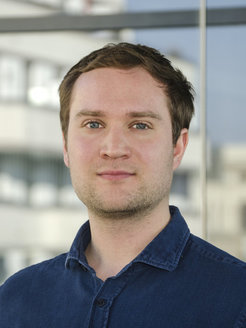Three questions to...
...this year’s winner of the Otto Hahn Medal, Leon Kroczek
Each year the Max Planck Society honours young scientists and researchers with the Otto Hahn Medal for outstanding scientific achievements. This year, Leon Kroczek, former PhD student of IMPRS NeuroCom at the Max Planck Institute for Human Cognitive and Brain Sciences (MPI CBS), won one of the prestigious awards.

Could you explain what is special about your work?
There is no speech without speaker. In my dissertation I investigated how listeners adapt to the individual language use of a particular speaker and how this adaptation affects language processing in the brain. Different persons have different ways to use language, for example with respect to dialect or expressions but also with respect to the use of syntactic structure. When listening to a person we process this speaker-specific language use and adapt to it.
I implemented a novel experimental paradigm where participants listen to sentences produced by two speakers. Each speaker has a characteristic and distinct way to use syntactic sentence structure. Using such a paradigm, I could show that it only takes a couple of sentences for listeners to generate speaker-specific expectations about syntactic structure. Importantly, these expectations can be re-activated even after several months. Furthermore, these expectations are evident in neural processes. For instance, I could show increased neural activation when a speaker uses a syntactic structure that is not typical for that particular speaker. Finally, expectations are used to inform language processing. My results indicate that this interaction of speaker and linguistic information takes place on a late and controlled processing stage.
In my dissertation I used several different neuroscientific methods and I combined them in a neuro-cognitive model of speaker-specific language processing. This model describes how the brain differentiates between different speakers and then uses this information in language processing. This could explain, why it is more demanding to listen to a new, previously unknown speaker in comparison to a speaker that has been known before. On a more abstract level, my work demonstrates the brain’s capability to use different sources of information in language processing.
What interests you about this field of research?
I think that it is fascinating that listeners only need to listen to a couple of sentences of a particular speaker in order to generate specific expectations about the language use of that speaker. Importantly, basic principles of language processing remain represented in the brain. This allows for highly efficient information processing, as both individual differences and general principles are implemented on a neural level.
The award-winning thesis is in the bag. What comes next?
I have already taken up a PostDoc position at the University of Regensburg, where I study human social interaction and social learning by interaction. I am interested in basic mechanisms on a behavioral and neural level. With respect to methods I started to use Virtual Reality as a tool to conduct naturalistic and highly-controlled experiments.




